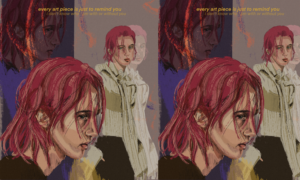I’m not sure if the universe could have cooked up a more fitting album for our current situation than Jeremy Zucker’s solo debut, love is not dying (2020). Throughout the 40-minute release, Zucker employs his unique brand of intricately assembled melancholic pop to explore themes of loneliness, emotional isolation, and resolve in the face of life’s chaos. The result, while definitely not perfect, is certainly a compelling listen for those of us dealing with the quarantine blues.
Landing between the catchy, synth-driven beats of Jon Bellion and the gloomy, almost desolate tone of Billie Eilish, Zucker’s angle with the album is abundantly clear: He’s upset, trapped by the anxieties and weariness of a digital generation. Even so, Zucker is still able to carve out his own space in an industry that can often feel flooded with the generic “sadboi” aesthetic. With the help of creative instrumental choices and honest, personal writing, Zucker delivers a portrait of himself that goes beyond cliche melodramatic woes.
Perhaps the best example of this tone comes from the starkly-titled second track, “we’re fucked, it’s fine.” Carried by a soft guitar riff and interspersed with windy ambiance, Zucker laments over his inability to deal with the turbulence of emotional vulnerability: “The weather’s nice / Hold me tight, I’m coming undone / Life would be so boring without you / I thought about it all last night.” This track does a great job introducing the listener to Zucker’s production—it’s anchored in mellow, clean tones, and it always gives the vocal performance center stage.
At times, the consistency of this reservedness can be a detriment to the album overall, especially near its latter half. For instance, “hell of flying” is a perfectly fine piano ballad on its own, but as the tenth track in an already somber record, the four-minute piece starts to feel like a retread of exhausted ideas. The same can be said about tracks like “orchid” and “julia”—they’re not bad by any means, and I enjoy them on their own, but their length and similar subjects bring them down when accompanying the rest of the record.
Luckily, this isn’t an issue that plagues the album too strongly. Some of the record’s best moments actually come when Zucker bucks his own subdued presentation and allows the gloominess to transform into frustrated passion.
The third track, “somebody loves you,” is the first time this alternative style is showed off. The song begins with an airy beat, wistful lyrics, and a familiarly restrained vocal tone. It’s pretty standard, barring the fun addition of a flute in the chorus. Then, a little over halfway through the song’s run length, the energy is heightened seemingly out of nowhere: the vocals gain a nice filtered quality, as though they’re sung through a voicemail; the synth becomes much bassier and fills out the track; and most importantly, Zucker’s performance transitions from a near whisper into an impassioned shout. On first listen, this was the moment when the album really took me by surprise and engaged me enough to keep my attention.
The same transformative effect is present in other tracks as well. Songs like “not ur friend” and “full stop” could have easily been built as standard pop tunes—inoffensive, if uninspiring—yet their tonal shift midway through and superb delivery on Zucker’s part bring them into their own and create an original sound that I really enjoy.
The best of this style comes in the fifth track, “lakehouse.” The first half of the song is very much in line with the rest of Zucker’s somber production aesthetic, complete with an entrancing mandolin and ghostly vox. The track’s story is told with some of the most compelling lyrics on the album: “A lake in the mountains could help me reset / A sky full of stars / Heaven’s arranged us to be where we are / But hell, I’m afraid / ‘Cause being without you is sounding okay.” This on its own is the makings of a good song, but the final 45 seconds of the track is really what hits it home. The chorus blasts into a fun, angst-filled electric guitar solo, the bass is boosted, and Zucker brings just the right energy to shout out one final chorus.
From a wider perspective, love is not dying is something of a mixed bag. The gloomy electropop package shines thanks to Zucker’s production style and tonal consistency, yet for the same reason, the repetitiveness of some of its themes makes the slower sections drag on for longer than necessary. Once you zoom in, however, the high points of the album absolutely hit the mark and show that Jeremy Zucker definitely has a little more up his sleeve than the industry’s standard popstar.
VOICE‘S CHOICES: “lakehouse,” “we’re f****d, it’s fine,” “somebody loves you”






[…] Source link […]
[…] Source link […]